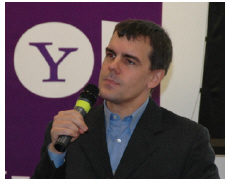Prediction: Predictive markets will be a next big thing

Prediction markets may be the next big thing. Maybe. At an evening “confab” at Yahoo a number of experts in the prediction market field talked about the value to corporations of tapping into collective intelligence . The author of popular book, The Wisdom of the Crowds, James Surowiecki moderated the mini-conference.

“The success of prediction markets will show that real knowledge is within the organization as a whole and employees have a lot to say about what the future looks like,” Surowiecki said.
Prediction markets are not like public opinion polls, in which people vote for who they want to win. The mechanisms for prediction markets are more like the stock market, with knowledgeable people betting on the most likely outcome of an event. Several prediction markets currently exist, such as blic examples include TradeSports, Iowa Electronic Markets, Hollywood Stock Exchange, HedgeStreet, Yahoo Tech Buzz Game, NewsFutures and Inkling Markets.
Prediction markets have proven to be more accurate than other mechanisms for predicting outcomes. Eric Zitzewitz, an assistant economics professor at Stanford, showed how predictions did a better job that traditional methods in predicting the effects of election outcomes on the economy, showing that control of Congress has 10 to 30 percent as much influence on economic policy as the presidency. Prediction markets could be applied to studying the effect of public policy decisions on stocks, the effects of corporate policies, mergers & acquisitions and market views of Zitzewitz said.
However, it's difficult for organizational structures based on command and control to give up power and embrace the wisdom of employees, Surowiecki said. “Predictive markets run counter to the way almost intuitively think knowledge should be structured and predictions made,” he said. “They make it significantly easier to access the knowledge of the people in the organization, but companies don’t know how to get at it.”
[poll id=27]
In addition, the Net generation entering the workforce, brought up on steady diet of instant messaging and social media, won’t adapt easily to a corporate culture that is too hierarchical and doesn’t allow for diverse voices to be heard.
Most important in any prediction market is coming up with unambiguous questions, the experts said, such as the consequence of raising pricing by 10 percent, acquiring a firm, firing a CEO (clearly with anonymity applied), predicting component pricing or getting a project done on time by dropping a feature. "The value in prediction markets is if you ask the most important questions, no matter who it bugs, to get the highest value. What would happen if ran a form of government with these kinds of markets?," Hanson asked.
Hewlett-Packard has internally used predictions markets to predict DRAM pricing and is rolling a project out with a marquee customer next month, according to Leslie Fine of HP Labs. Her group's research has focused on the "wisdom of the conference room or water cooler," take bias, manipulation and hierarchy out of predictions within small groups. Instead of whoever yells the loudest, the wisdom of the small crowd rules.
Saddled with the name BRAIN--Behaviorally Robust Aggregation of Information Networks--HP has applied its technology to predicting memory pricing. She described it as a "betting game with a behavioral twist." For predicting memory pricing, instead of a series of contentious meetings, the group, which included contract negotiators and others with credentials to contribute individual wisdom, had a few hours training in using the prediction market mechanism and were asked to make six predictions--one, three and six month pricing for two kinds of memory. The end result was less time spent and more accurate predictions.
"Proper scoring rules incent truthful revelations, but we all have different preferences for risk. We needed way to amplify or temper the strength of an opinion. We designed a mechanism to contrast individual coefficients for each player, to summarize the risk attitude for each player beforehand," Fine said. The bets are aggregated and weighted on the risk profiles. It takes about 15 minutes for a small group, with some expertise or knowledge relevant to the question, to collectively answer a questions, such as if a bluetooth adapter is included in product X, what will the market share be.
In a one year trial with 14 finance executives in the HP Services group, the BRAIN treatment predicting operating profits outperformed the traditional method in every quarter. In January, HP is launching a prediction market for drug giant Pfizer after a year trial.
The presenters noted some concerns, including legal and moral issues, as well as the more pedestrian self-defeating prophecies, decision selection biases, too many bozos in the collective pool, timeframe factors, and poorly asked questions, such as "Will my wife get pregnant next month?" (the most clueless question Adam Siegel of Inkling Markets has seen so far).
Prediction markets and other group decision-making mechanisms that capture collective intelligence, the wisdom of the crowds have the ingredients to be a the next big thing, a tool that becomes part of mainstream corporate and digital life. It seems to work better than endless meetings, emails and spreadsheets. It's inherently social and perhaps viral, a kind of game that can have serious impact and consequences. But it's not business as usual. The cultural change more than any technological impediment will hold it back in corporations, but like the flurry of Web 2.0 technologies seeping in the back door, I'll predict that prediction markets will become a next big thing.